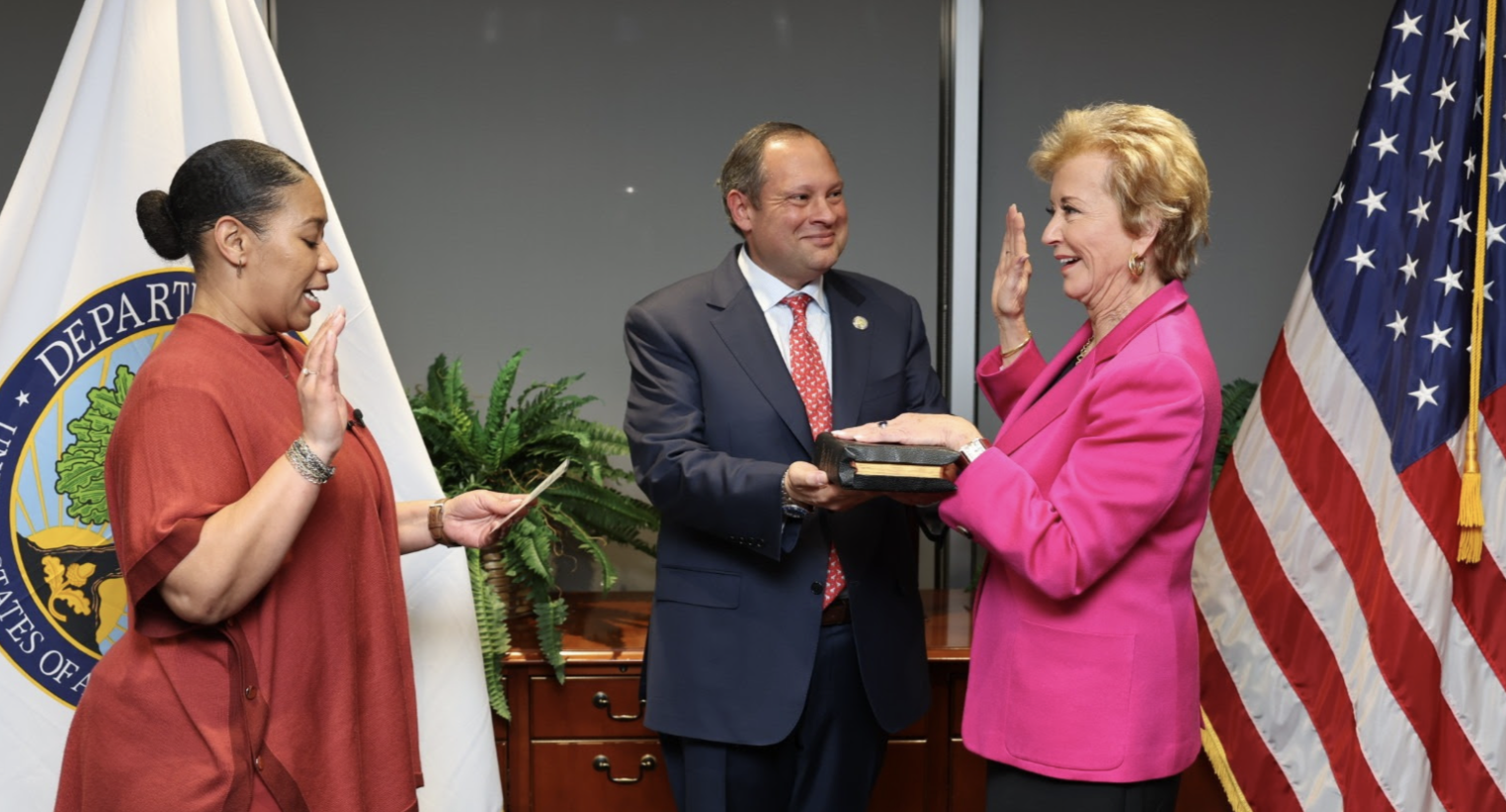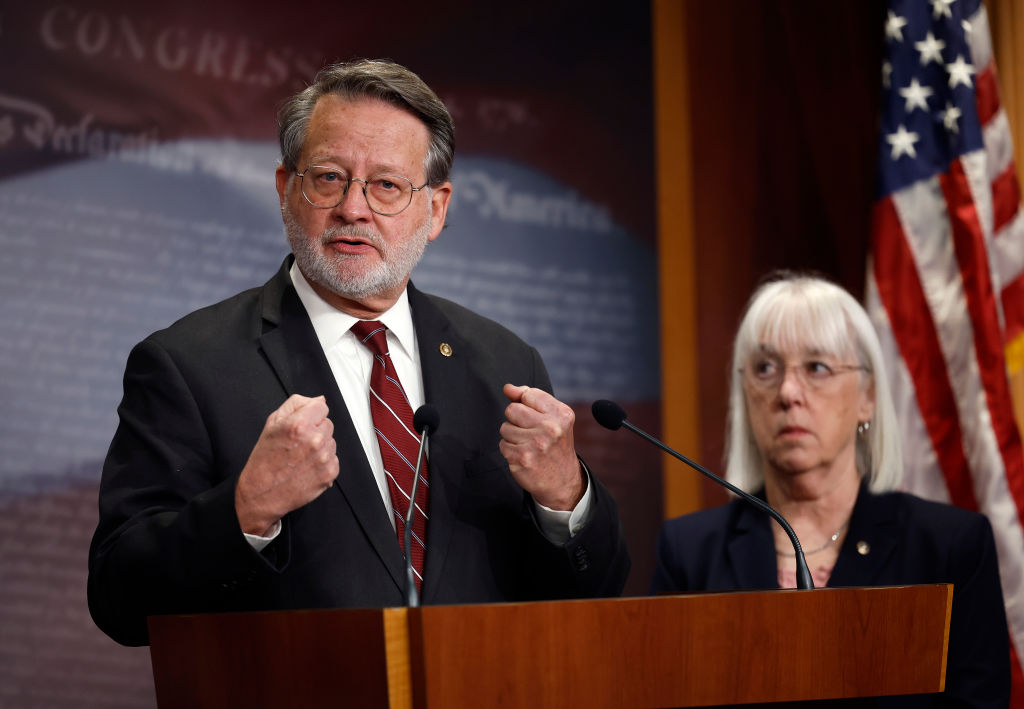An Unprecedented Start for the Education Department’s Latest — and, Some Hope, Last — Secretary
Linda McMahon inherits an agency in turmoil as President Donald Trump presses on with plans to fracture the 45-year-old department.

Get stories like this delivered straight to your inbox. Sign up for The 74 Newsletter
Following a chaotic six weeks of cuts, terminations and unusual vitriol, Linda McMahon begins her first full day Tuesday as the latest and, some hope, last U.S. Secretary of Education.
Confirmed by the Senate late Monday in a 51 to 45 party-line vote, McMahon steps into the education department as President Donald Trump’s Department of Government Efficiency continues its aggressive push to make the government’s smallest cabinet department even smaller.
“We must start thinking about our final mission at the department as an overhaul — a last chance to restore the culture of liberty and excellence that made American education great,” she wrote in a Monday night email to agency staff, shared with The 74. She encouraged employees to be “enthusiastic” about what’s to come.
Last week, however, they received letters encouraging them to take a buyout by midnight Monday in advance of “large-scale reductions in force.” In addition to outlining how she’ll execute that goal by March 13, McMahon has until mid-April to submit blueprints for how she’d run a leaner department. Those orders come on top of steps DOGE has already taken to slash spending, eliminate staff and eradicate programs that don’t fit the president’s agenda. A flurry of lawsuits challenging those actions are working their way through the federal courts.
It goes without saying that it’s a beginning unprecedented in the 45-year history of the department.
“Usually, administrations wait until they have agency heads in place, and those agency heads roll out new priorities or initiatives,” said Julia Martin, director of policy and government affairs with The Bruman Group, a Washington law firm. Now, the script is reversed, due to a slow confirmation process and “rapid-fire, government-wide” efforts by DOGE to clean house. “We’ll see what, if anything, changes when she’s officially in office.”

‘Grown-ups in the building’
Some advocates say whatever happens with McMahon at the helm is bound to be an improvement after a month of DOGE’s rushed and often chaotic efforts to downsize and reshape the agency.
“I think we’ll all feel a little bit better knowing that there are some grown-ups in the building,” said Keri Rodrigues, president of the National Parents Union, an advocacy group.
Many DOGE staffers assembled by billionaire Elon Musk are college-age engineers with little, if any, government experience. Rodrigues hopes the Senate follows up quickly to confirm nominees with education leadership experience, including Penny Schwinn, former Tennessee education chief, as deputy secretary, and Kristen Baesler, North Dakota superintendent, as assistant secretary in charge of K-12 education.
“I don’t think it’s great to have 19-year-old kids just looking for big pots of money via AI and slashing whatever they see indiscriminately,” she said.
But many conservatives think an overhaul of the bureaucracy is long overdue.
“National test scores continue to prove our education system is in an undeclared state of emergency,” said Tommy Schultz, CEO of the American Federation for Children, which supports private school choice.
Released in January, the most recent National Assessment of Educational Progress results showed that students continue to lose ground in reading. Eighth grade results in math were flat, and while fourth graders saw some gains in the subject, they were driven by the highest-performing students.
He called McMahon’s confirmation “the beginning of the end” for the federal government’s role in education.
“Something has to change,” he said. “As Ms. McMahon affirmed, she and President Trump are strong supporters of school choice and returning control of education to the states and families.”
In her Monday email to department staff, McMahon said the overhaul was necessary to fix a an education system “not working as intended.”
“Since its establishment in 1980, taxpayers have entrusted the department with over $1 trillion, yet student outcomes have consistently languished,” she wrote. “Millions of young Americans are trapped in failing schools, subjected to radical anti-American ideology, or saddled with college debt for a degree that has not provided a meaningful return on their investment. Teachers are leaving the profession in droves after just a few years—and citing red tape as one of their primary reasons.”
But shuttering the department would take time if it happens at all. Experts say it’s doubtful the president could muster the 60 votes in the Senate needed to abolish the agency — every Republican and seven Democrats. A new poll shows nearly two thirds of Americans are opposed to eliminating the department.
In the meantime, McMahon, former CEO of World Wrestling Entertainment, is likely to face tough questions from Democrats, education leaders and advocates about how she’d maintain core education functions required by law, whether they’re carried out by the department or not.
Those include distributing funding for high-poverty schools and protecting students’ civil rights. Advocates warn that other agencies lack the expertise to administer programs for students with disabilities and would be less responsive to civil rights complaints.
“I’ve had concerns from the outset about whether Ms. McMahon has the experience we should expect from an education secretary, and I’m sorry to say my concerns have not been alleviated,” Democratic Sen. Patty Murray of Washington said ahead of the vote.

But Democrats aren’t the only ones questioning whether the department should close completely. Even Trump, who has called the department a “con job,” will need officials with education expertise to carry out some of his priorities.
The department has wasted no time ramping up investigations of districts implementing racial diversity initiatives, or allowing transgender students to compete in sports or use bathrooms consistent with their gender identity.
On Monday, the department’s Office for Civil Rights announced an investigation into the Tumwater School District in Washington state, prompted by a 15-year-old female basketball player who complained that the district allowed a transgender student to play on her team.
“There absolutely is a role for the Department of Education, and the Office for Civil Rights specifically, to right the ship, to ensure that people’s civil rights are being protected,” said Tiffany Justice, co-founder of the conservative group Moms for Liberty.
She trusts McMahon not to “just parcel things out to other departments that will not be able to handle them.” And she considers McMahon’s background a complement to DOGE’s tech expertise.
“Linda is a businessperson,” Justice said. “Taking a business lens to the way that the government is working … is very important.”
But even some conservatives are calling out for greater accountability of DOGE’s work.
Nat Malkus, deputy director of education policy at the right-leaning American Enterprise Institute, found that DOGE dramatically overestimated how much money it’s been able to save taxpayers.
While the department announced it had canceled nearly $900 million in research contracts, his analysis showed the amount was actually less than $600 million. Factoring in funds already spent reduced the figure even more.
DOGE’s “sloppy work,” he wrote, “should give pause to even its most sympathetic defenders.”
According to the American Federation of Government Employees, which represents more than 2,800 education department workers, nearly 150 staff members had either been terminated or put on paid leave as of last week. That number, however, doesn’t include fired managers or supervisors, or those who accepted the most recent buyout, according to the union.
The union isn’t advising employees whether to accept a lump sum in exchange for resigning, but noted that the letter only offers up to $25,000.
“Many employees would get less than that,” a spokesman said. Those who end up returning to the department within five years would also have to pay back the gross amount even after paying taxes on it, the spokesman said.
‘Cost-cutting exercise’
The Feb. 26 memo on staff reductions told officials to focus on cutting “functions not mandated by statute or regulation.”
The same day, Trump also ordered DOGE to create a new system for recording every contract, grant and loan and for employees to justify each payment. The purpose, the order says, is to “ensure government spending is transparent and government employees are accountable to the American public.”
Experts say databases like grants.gov and USASpending.gov already serve that purpose. Martin, with Bruman, said the order could be another attempt to justify further cuts based on the descriptions of the expenses.
The executive order would also require education staff to justify any “non-essential” travel, which Martin said could hinder officials’ ability to visit classrooms and interact with state and local leaders.
“Can they no longer go see programs in action or get feedback from the field?” she asked. “Those are the kind of things that improve program functionality and efficiency — and arguably, reduce government waste.”
Good morning!
— ED Press Secretary (@EDPressSec) March 4, 2025
RT if you’re ready to Make Education Great Again 🇺🇸 pic.twitter.com/tqLYp09Eob
But one school finance expert thinks it’s not a bad idea.
Rebecca Sibilia, executive director of EdFund, a research organization that focuses on school finance, said such a system could give McMahon a head start on understanding the department’s many programs and would be preferable to the “DOGE circus we’ve been watching thus far.”
Get stories like these delivered straight to your inbox. Sign up for The 74 Newsletter

;)
